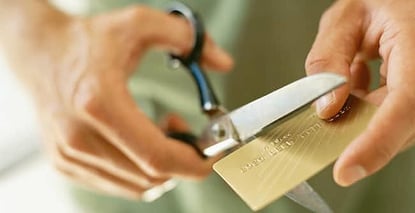Credit card debt is incredibly common in America, but letting it get out of control can result in financial destruction. Follow these steps to effectively pay off your debt and enjoy financial freedom.
1. Assess the damage
Sometimes when people are in major credit card debt, they feel overwhelmed and may stop opening the bills.
If you’re going to take control of your credit card debt, it’s time to take the music and tally up the damage. It may be difficult to take an honest look at the hole you’ve dug yourself into, but you can’t move forward without it.
Look up all your balances and make a chart that details how much you owe and at what interest rates. This will help you form a clear picture of what you have to tackle.
2. Make a plan
Now that you know exactly how much you owe to your creditors, it’s time to make a payoff plan.
First, add up your minimum monthly payments. Are you able to pay this amount every month? If not, make a list of your monthly income and your required monthly expenses (leave off anything not necessary, like shopping or eating out).
You may find some wiggle room here. Yes, this means putting your remaining disposable income toward debt instead of fun times, but it’s worth it in the long run.
Note you cannot get out of debt anytime soon if you only make minimum payments. Interest will keep building and you won’t make much progress.
“Learning how to be financially
responsible will help you stay debt free.”
3. Get help
Have you crunched the numbers and found you can’t make your minimum credit card debt payments? Call your issuers right away and let them know your problem.
They may be able to help you make a payment plan. If they are unable to help you, call a legitimate credit counseling company. They can help you create a plan you can afford.
4. Consolidate your debt
If your credit card interest rates are high, whether due to paying your bill late or because you have bad credit, you may stand to benefit from consolidating your debt. The way this works is you apply for a new credit card with a lower interest rate, ideally one with a long 0%
introductory APR. Then transfer all of your credit card debt from other cards onto this card. It will consolidate your debt at one low interest rate, making it easier for you to pay off your balance faster since interest won’t accrue as quickly.
5. Make lifestyle changes
Now that you have a plan in place, it’s important to identify what patterns and behaviors got you here.
Are you regularly spending more than you earn? Are you putting things you want but can’t afford on plastic instead of saving? It’s time to start living within your means by living on a budget.
Learning how to be financially responsible will help you stay debt free once you have paid off your credit card debt.
Photo credit: angelpub.com
Advertiser Disclosure
CardRates.com is a free online resource that offers valuable content and comparison services to users. To keep this resource 100% free, we receive compensation for referrals for many of the offers listed on the site. Along with key review factors, this compensation may impact how and where products appear across CardRates.com (including, for example, the order in which they appear). CardRates.com does not include the entire universe of available offers. Editorial opinions expressed on the site are strictly our own and are not provided, endorsed, or approved by advertisers.





![9 Best Ways to Pay Off Credit Card Debt (From Expert Beverly Harzog) ([updated_month_year]) 9 Best Ways to Pay Off Credit Card Debt (From Expert Beverly Harzog) ([updated_month_year])](https://www.cardrates.com/images/uploads/2017/10/Beverly-9Best.jpg?width=158&height=120&fit=crop)
![6 Best Loans to Pay Off Credit Card Debt ([updated_month_year]) 6 Best Loans to Pay Off Credit Card Debt ([updated_month_year])](https://www.cardrates.com/images/uploads/2018/02/loans.png?width=158&height=120&fit=crop)
![How to Pay Off Credit Card Debt ([updated_month_year]) How to Pay Off Credit Card Debt ([updated_month_year])](https://www.cardrates.com/images/uploads/2022/02/How-to-Pay-Off-Credit-Card-Debt.jpg?width=158&height=120&fit=crop)
![5 Best Credit Card Loans to Pay Off Your Debt ([updated_month_year]) 5 Best Credit Card Loans to Pay Off Your Debt ([updated_month_year])](https://www.cardrates.com/images/uploads/2017/08/loans2.jpg?width=158&height=120&fit=crop)

![11 Best Credit Cards to Pay Off Debt ([updated_month_year]) 11 Best Credit Cards to Pay Off Debt ([updated_month_year])](https://www.cardrates.com/images/uploads/2019/06/Best-Credit-Cards-to-Pay-Off-Debt-Feat.png?width=158&height=120&fit=crop)
![[current_year] Credit Card Debt Statistics (Average U.S. Debt) [current_year] Credit Card Debt Statistics (Average U.S. Debt)](https://www.cardrates.com/images/uploads/2018/04/shutterstock_243114739-edit.jpg?width=158&height=120&fit=crop)